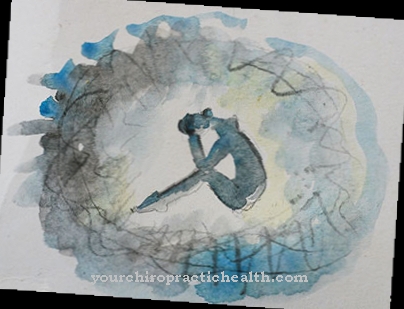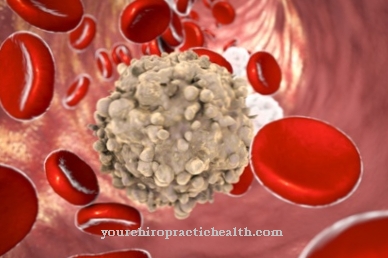In the schizotypic personality disorder it is a serious mental disorder. Those affected suffer from significant changes in their emotional and relationship areas.
What is schizotypic personality disorder?

© BillionPhotos.com - stock.adobe.com
The schizotypic personality disorder is also as schizotypal disorder known. It should not be confused with schizoid personality disorder. This mental illness leads to severe behavioral deficits that affect the psychosocial and interpersonal areas.
The medical classification of the schizotypic personality disorder is not clear. The ICD-10 code does not assign the disease to personality disorders, but to delusional and schizophrenic disorders. In contrast, the US-American DSM-IV classification evaluates the mental disorder as a personality disorder. This makes an exact classification of the schizotypic personality disorder difficult. A differentiation from schizoid personality disorder has only recently taken place.
causes
The exact causes of the schizotypic personality disorder have not yet been clearly identified. Experts suspect a multi-causal development of the mental disorder. Genetic factors, among other things, are conceivable triggers. The typical schizozoan disorder often manifests itself within families in which schizophrenia has already occurred. Therefore, medical professionals assume that there is a common genetic disposition for both mental illnesses.
Traumatic experiences in early childhood can also play a role. For example, people with schizotypic disorder were often physically or sexually abused in their childhood. A difficult birth is also considered a traumatic experience. Another possible cause is neglect of the affected person in early childhood. The patients did not have a close relationship with their parents during this period. One possible reason for this could be a mental illness in the mother, which means that she is not fulfilling her role sufficiently. Another cause is assumed to be hospitalism.
Symptoms, ailments & signs
In the context of the schizotypic personality disorder, the affected persons experience profound interpersonal and social deficits. Patients are unable to enter into close relationships because they make them uncomfortable. In addition, they suffer from distortions in thinking and perception. Those affected only rarely make social contacts. Because of their deep distrust of other people, their relationships do not last long.
Even when they are with someone for a long time, they cannot reduce their distrust. In fact, the opposite is usually the case and feelings of suspicion are increased. It is not uncommon for those affected to be irritable and aggressive. Furthermore, they appear unemotional, indifferent and inaccessible.
In addition, people with schizotypic personality disorder develop behavior that is classified as unconventional. This includes, among other things, an unkempt or bizarre exterior. In addition, the patients use a peculiar language. This can be confused, contrived and cumbersome. Some of those affected succeed in creating extraordinary works of art, which can be attributed to their pronounced sensitivity.
However, people with profound schizophrenia rarely have artistic talent. Instead, their thinking is more abstract or technical-functional. Other possible symptoms of schizotypic personality disorder are the development of paranoid ideas, relationship ideas or autistic sinking. In addition, those affected often brood compulsively, although their thinking is often aggressive or sexually motivated.In severe cases, hallucinations are also possible. Around two thirds of all patients have other mental disorders. These can be depression, anxiety disorders, addictions or eating disorders.
Diagnosis & course of disease
Identifying schizotypic personality disorder is not always easy. Patients rarely see a doctor of their own accord. The therapist bases his diagnosis on the patient's medical history and on the typical symptoms of the disorder such as compulsive brooding, paranoid ideas, eccentric behavior patterns, idiosyncratic appearance, social withdrawal or hallucinations.
As a rule, the schizotypic personality disorder takes a chronic course. The intensity varies from person to person. In some cases there can be clear schizophrenia. The course of mental illness mostly corresponds to a conventional personality disorder.
Complications
Schizotypic personalities often live withdrawn and have little contact with other people. Many of them have poor social skills. This sometimes results in complications for friendships, acquaintances and family life. The professional career can also suffer from the social deficits - in dealing with customers as well as with colleagues and superiors.
Aggressive behavior is possible, but it does not affect all people with schizotypic personality disorder. If the person suffers from paranoid thoughts, these can also lead to complications. The high level of suspicion in some cases creates an obstacle to treatment as the schizotypical personality may not seek help.
Sometimes not only psychological help is refused, but also medical help, for example in the event of an injury or illness. This makes it possible for such a physical illness to worsen unnecessarily. Schizotypic personality disorder can be associated with another personality disorder or be accompanied by another mental illness. Common comorbidities of personality disorders include anxiety disorders and depression.
Some people develop an eating disorder or substance addiction. This arises partly in the attempt to find a "drug" against the schizotypic complaints. For example, some people drink alcohol in order to be more relaxed and less inhibited in social situations. Such attempts can easily lead into the vicious circle of addiction.
When should you go to the doctor?
Behavioral problems or peculiarities of social interaction should always be assessed by a doctor. If you are emotionally distant, unable to build social bonds or have a strong distrust of other people, it is advisable to clarify the symptoms. A lack of awareness of the disease is characteristic of a schizotypic personality disorder. Those affected experience themselves as normal and see the problems in the people around them. It is therefore a challenge to get the person concerned to see a doctor. A close and stable bond is necessary, but this is typically rejected.
If you experience emotional distress or feel uncomfortable in contact with other people, you should consult a doctor. If there is an aggressive demeanor, emotional injuries or the repeated disregard of social rules, a doctor's visit is advisable. In particularly severe cases, a medical officer should be called.
Actions that are self-endangering or hurtful are worrying. You should be presented to a doctor. The person concerned needs help with hallucinations, delusions, strong fears or a depressed appearance. A doctor is needed as soon as the symptoms become a burden in everyday life or new symptoms appear. Eating disorders or tendencies towards addiction are also characteristic of the personality disorder and should be examined.
Therapy & Treatment
Treatment of schizotypic personality disorder is just as difficult as diagnosis. Quite a few patients defend themselves against therapy in the initial phase. Cooperation with them can only be achieved through persuasion or coercion from partners or relatives. Other health problems such as addictions or depression also play a role.
As with all other personality disorders, the focus of schizotypic personality disorder is not on curing the disease. Rather, the social competence and the social environment of the patient should be improved. Psychotherapy and sociotherapy are used here. At the beginning of treatment, it is important to establish a trust-building relationship between patient and therapist. However, this is usually a major challenge for everyone involved. If the establishment of a stable relationship is not successful, this ends with the termination of the treatment.
If the patient suffers from other psychological disorders, he is given appropriate medication such as antidepressants in the event of depression. If, on the other hand, there is an accompanying anxiety disorder, he is often given neuroleptics. Lithium and carbamazepine can also be used to ensure stability. Sedatives such as benzodiazepines are useful for treating panic attacks.
You can find your medication here
➔ Drugs for personality disordersprevention
Because the causes of schizotypic personality disorder are not precisely known, no suitable preventive measures are available.
Aftercare
Psychotherapeutic follow-up care is necessary for a schizotypic personality disorder. The duration and intensity (i.e. the frequency of the therapy hours) depend on the severity of the disease. Schizotypic personality disorders are associated with behavioral problems. Behavioral follow-up care is therefore recommended in parallel with psychotherapy.
After a stay in psychiatry, the person affected will receive follow-up support when they return to everyday life. The goal is a largely symptom-free life after a completed treatment. Mutual trust between the doctor and the sick person is a basic requirement for successful follow-up care. During the follow-up treatment, the patient learns how to deal with his illness consciously.
At the same time, his self-esteem should be strengthened, since those affected often experience social stigmatization. This can happen at work, with friends or within the family. Overstrained relatives also have the opportunity to contact the psychotherapist with personal questions. During drug treatment, the therapist monitors the long-term healing progress.
A resulting drug addiction should be prevented. If there is no progress or deterioration, the dose is increased, more adequate medicine is administered or the entire therapeutic approach is changed. As part of the follow-up care, the specialist arranges for a hospital admission if the patient's condition has deteriorated significantly and / or if he asks for it himself.
You can do that yourself
The schizotypic personality disorder can turn into schizophrenia. Schizophrenia is essentially characterized by stronger and clearer symptoms than schizotypic personality disorder. However, the nature of the symptoms is similar. Therefore, it makes sense for those affected to observe themselves carefully and inform their doctor or therapist if the symptoms worsen.
The external living conditions also deserve attention. Not all living conditions can be controlled - a job loss or a divorce is usually not wanted. Those affected should, however, bear in mind that in such phases of life the probability of a relapse or deterioration is particularly high. Good self-care is therefore particularly important in these times.
A stable environment helps to stabilize the psyche. People with a schizotypic personality disorder can take care in everyday life to maintain regular social contacts that they find pleasant. However, one of the characteristics of schizotypic personality disorder is that sufferers have difficulty developing and maintaining deep relationships. That is why psychologists consider targeted training of social skills to be useful. If self-help is not enough, behavioral social training is an option, for example.
























.jpg)



